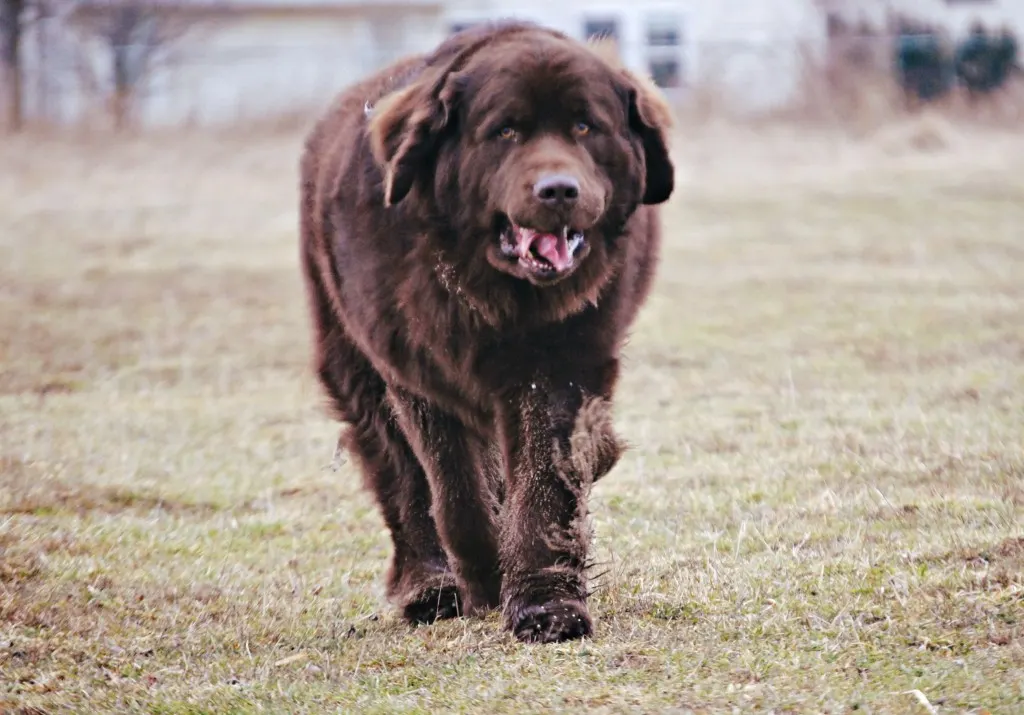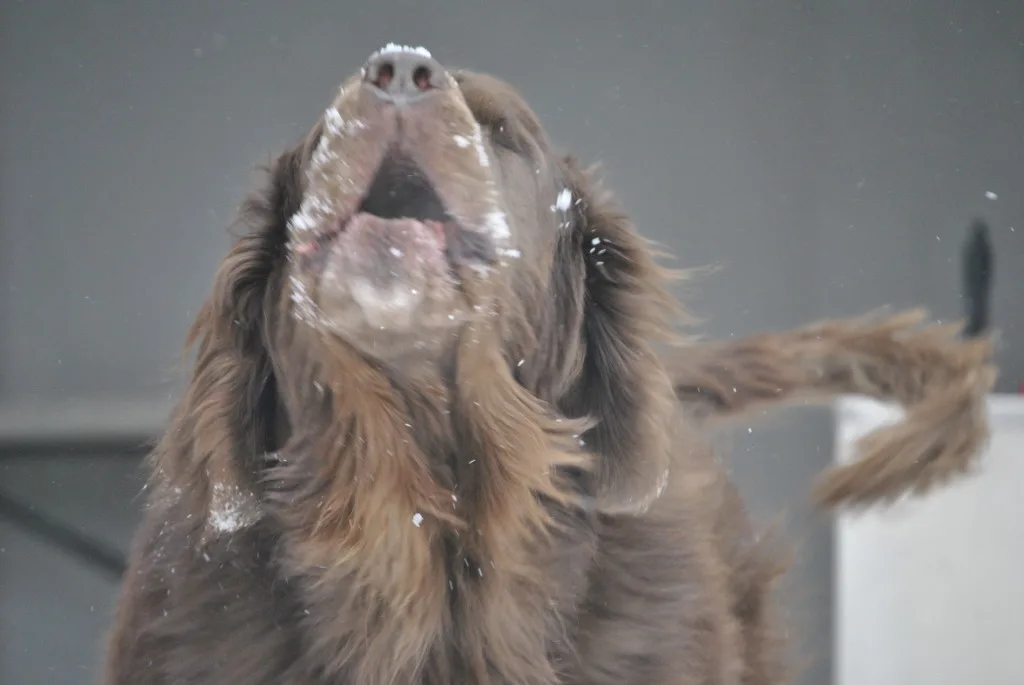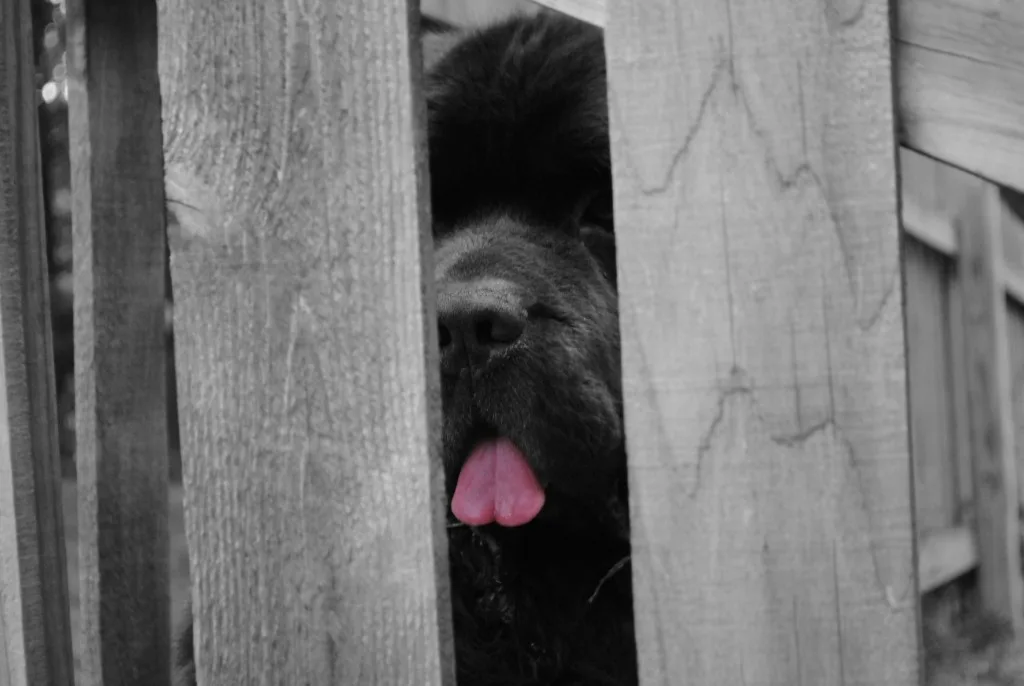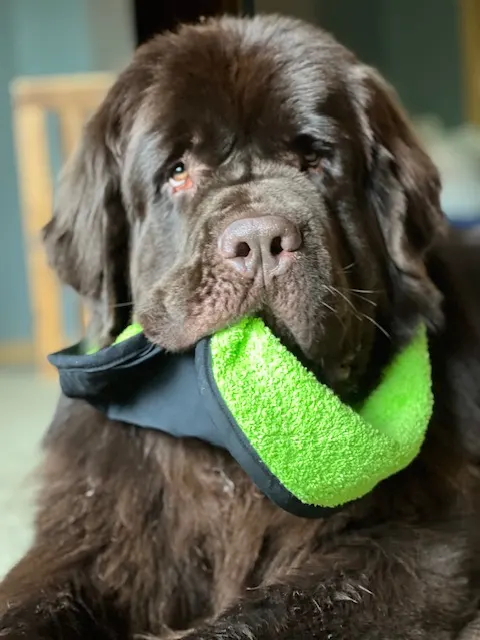
Newfoundlands are typically known as great family dogs.
It’s ingrained in the literature that they are sweet and gentle and great companions for young children and adults.
the literature isn’t wrong and Newfies are an amazing breed and one that is very close to my heart.
However, just like with any breed, there are some behavior problems that new owners of the breed might not be aware of.
The first time that these problems popped up in my Newfoundlands, I was totally caught off guard.
Many of these behavior issues begin to appear during the adolescent stage and if not caught and corrected they can turn into big problems in adult Newfies.

Most of these behavioral issues are seen in many other breeds but quickly turn into bigger issues with bigger dogs.
Some of the more common behavior issues that are seen in Newfoundlands are:
- Jumping
- Barking
- Counter-Surfing
- Leash Pulling
- Digging
- Separation Anxiety
- Resource Guarding
- Selective Hearing
- Prey Drive
- Mouthing

We’ll go over each of these behavior problems in a little bit but first, let’s talk about the obvious.
No dog is perfect and while many people make it a point to share how perfect their Newfie is, almost all of them have had to overcome some if not all of these problems at some point in time during their Newfie’s life.
Most of these issues begin to appear during a Newfie’s adolescent years and many of them are tied to common Newfie traits which should defintely be considered if you’re trying to train these behaviors out.
A Newfie is a dog first, and a nanny, gentle giant, goofy newfy, best friend and lap dog, second.
This topic isn’t talked about enough in our community and I feel like it really should be.

I want every new owner of our breed to be set up for success and not failure.
We should want to share the entire Newf journey, not just the highlights.
Raising a Newfie is tough and it’s not for everyone.
We enjoy a lot of it, but not all of it but most of us will do it over and over again.
Top Behavior Issues Seen In The Newfoundland Dog
Jumping.
Jumping can be a frustrating behavior issue seen in Newfoundlands in their younger years.
It’s a behavior that should be addressed immediately and not taken lightly because someone, especially little children can get injured.
If you don’t want a 150-pound dog jumping, don’t let a puppy do it.
Leroy was our jumper.
Lou is an excited jumper and a work in progress.

Barking.
Newfies bark or they don’t.
Many things that you read online are going to tell you that barking is not a trait commonly seen in Newfoundlands and that is not correct.
Newfies are very capable of barking and are quite loud when they do it.
Many of them do it for a reason or for no reason at all.
Most Newfies bark because they are seeking attention.
They want something from you whether that be food, attention or their spot on the couch.

Don’t let his sweet adorable face fool you, right after this he barked and jumped on me:)
Lou is a barker.
He barks at nothing and he barks at everything.
He barks at birds, and dogs barking 5 miles away, when he wants to be fed, when he wants to be petted and when he wants to go for a walk.

Counter-Surfing.
When a Newf places his paws up on a counter and gets whatever he wants that is up there.
Sometimes it’s butter and other times it’s a pot of chili.
Sherman counter-surfed once and grabbed a package of cookies.
Leroy counter-surfs but just with his head.
He also table-surfs.
Lou is a counter-surfer.
We broke him of the habit by lining our kitchen counters with cookie sheets and we removed anything and everything in reach.

Pulling
Newfies are working dogs and many of them have the instinct to pull.
However, they are supposed to pull a cart, not you.
Having a pulling Newfie can be very dangerous for the person on the other end of the leash and for the dog.
Not only can they pull you down if they wanted to, but the pressure of them pulling when using basic walking gear can injure their neck.

Digging.
Newfs like to dig for various reasons.
Some like to dig to find a nice, cool place to lay, some do it out of boredom and others like to dig to eat dirt.
Whatever the reason is it can be a costly behavior and in some cases, it can lead to medical issues for the dog.
Leroy was a digger and getting him to stop wasn’t easy but we addressed his behavior and then curbed the digging.
No digging issues with Lou so far!

Check out 5 Ways To Stop Your Dog From Digging In The Yard
Separation Anxiety.
Newfie’s are working dogs and are happiest when they are with their owners and I think a lot of people underestimated how devoted they are to their family.
A Newfoundland who is left alone a lot and is not exercised both mentally a physically can suffer from separation anxiety and become destructive.
I think Leroy was the only Newfie that I’ve had that didn’t have some degree of separation anxiety.

This can entail tearing up things around the house such as floors, baseboards, furniture, and anything else they can get their mouths on.
Sherman used to chew on our wooden kitchen chairs.
Selective Hearing.
When they hear only what they want to hear.
I can hear you talking but you can’t come in.
Newfs can be stubborn but if they are constantly tuning you out then it might be something that you’re doing wrong.
Leroy had a severe case of selective hearing but Leroy also has a mind that goes a mile a minute.
He’s here and there and everywhere.

Resource Guarding.
Resource guarding can happen in any breed and the Newfoundland is not an exception.
There can be a number of things that they guard including food, toys, treats, specific areas, other pets, and people.
Sherman used to resource guard me, food, and treats, and yes it caused problems.
Lou seems to be doing pretty well in this area.
He shares his toys and he doesn’t guard his food.

Updating this a year later to add that as Lou got older, he showed some very minor signs of resource guarding toys and/or things he took like shoes.
I’ve taught him to “trade” now instead of just taking things away from him.
I do this by offering him something of higher value than what he has like a better toy or a treat.
This has worked REALLY well for us but might not work for every dog.

Predatory Drive (Prey Drive)
When you think of a Newfie the last thing most people think of is them chasing after a chicken or rodent and killing them but Newfies ARE dogs and some Newfies do have prey drive.
It’s a difficult behavior for many and sometimes cats are their prey.
Sherman had a small prey drive.
He’s caught a groundhog before, trapped a possum and isn’t allowed to have contact with our guinea pig.
He’s never actually killed anything that I know of so he doesn’t go through the whole prey drive sequence but I wouldn’t put it past him.

My first Newf ate baby bunnies.
Leroy has ZERO prey drive.
Odin had prey drive when we first adopted him but it’s mostly gone now.
I’m unsure about Lou at this time but he did make friends with a frog so I think he’s good.

Mouthing
Mouthing is one of those behaviors that is very common in Newfies and when we say mouthy, it’s not referring to barking or biting.
Newfoundlands are a working dog that uses their mouth and some have a very strong hold and carry instinct.
While adolescent Newfies might use their mouth a little harder than adult Newfies, mouthing should not be confused with biting.
A mouthy Newfie is more about taking your arm in their mouth and wanting to either gently nibble it or carry your arm.
It usually doesn’t hurt but it can catch an unsuspecting person off guard.
I was once told that it is part instinct because when Newfies are rescuing someone from the water they grab them by the arm and pull them in.
I don’t know how much truth is to this.

Sherman used to do this to me when he was excited, especially when I would come home from work.
Lou is VERY mouthy.
He likes to have something in his mouth, especially when he’s excited.
And here’s the thing for me, I don’t want to discourage Lou from wanting to carry things in his mouth, I want him to do that so instead of training that issue out, I’m trying to modify it so that he’s using his mouth the proper way.
I do want to discourage him from pinching me with his teeth though!

I always try to have something handy for him to carry in his mouth because if I don’t, he’ll use my hand or forearm.
For instance, Lou gets excited when someone comes home so I always try to have something in reach for him to carry.
I’ve found that fetch sticks and/or bumpers work well for Newfies that like to carry things.
I’ve also used empty paper towel rolls.

My Brown Newfies is a participant in the Amazon Services LLC Associates Program, an affiliate advertising program designed to provide a means for sites to earn advertising fees by advertising and linking to Amazon.com
Dealing With Your Newfie’s Behavior Issues
Many common behavior issues seen in the Newfoundland breed are a result of some of the unique traits so before you try to train them out, take a look again at the Newfoundland breed as a whole.
Speak to a professional dog trainer and see if there’s a way to modify the behavior without eliminating it.
Specifically, behaviors such as being mouthy, pulling and barking.
Behavior issues in any breed of dog take a lot of training, focus, dedication and consistency.
2 big things that I’ve made sure to work on with my Newfie puppy this time around are getting and holding his attention out in public and how to trade.

Also, check out 10 Tips For Training Your Newfoundland and see if there’s anything that you can implement into your training sessions.
Next, if you can’t get these issues under control we highly encourage you to get in contact with a dog trainer in your area.
Can’t wait and want to start researching now?
We recommend checking out the teachings of Ian Dunbar., The Newfoundland Puppy, early care and training by Judy Adler, (affiliate link) for starters.
And maybe your Newfie is showing you that they’re bored. How To Tell If Your Newfoundland Dog Is Bored

Are Newfoundlands Difficult?
Newfoundlands can be difficult if you don’t understand them.
They don’t respond well to harsh punishment or negative training.
They love their family and are happiest by their side.

Newfie meltdown shirt now available on Amazon
Newfies also learn quickly and can get bored with repetitive training so it’s important to find a method that works well for your dog and stick with it.
Teenage Newfies are the most difficult and need the most guidance.

Is There Hope?
Absolutely.
Leroy stopped jumping and Sherman stopped resource guarding.
Lou is continued work in progress every single day.
The selective hearing is probably the one and only issue that will remain for most of their life.
So you’re not alone.
Your Newf isn’t broken.

Thousands of other Newfie owners have gone through it and made it.
Not every second of having your Newfoundland is going to be wonderful.
There are going to be hard times with crying and frustrations and all of that is o.k.
There are also going to be great times, funny times and many proud moments and the hardest lesson that you are going to learn during this time is that your Newf will make mistakes and so will you.

I’m raising another Newfie puppy right now and I definitely refer back to this post from time to time to reassure myself that this is just a phase.
Remember, a Newfie is a dog first and a Newfie second.
The first year of raising a Newfie can be tough, the second might be even tougher, but by the third year, you’ll see it all come together!
p.s. I realize that there may be some that believe that they have a perfect Newfie with no behavior issues, I’m happy for you.
p.p.s. Of course, it’s worth it and of course, I wouldn’t change anything.

Ann
Thursday 10th of August 2023
What a wonderful piece! I fell in love with this breed when I, unfortunately, was already too old to have one. I so appreciate your honesty about the traits of this breed and the fact that raising a Newf will be difficult at times but rewarding overall. Thank you for sharing your expertise!
Jen
Thursday 10th of August 2023
Thank you so much for the kind words Ann!
Paul Fitzgerald
Thursday 3rd of August 2023
Hi Jen I have 2 chocolate labrador girls 11 and 9 I was thinking of getting a pup whether it is a labrador ,but I did like the look and character of the Newfoundland. They seem similar to the labs ,would I be correct in saying that. The other thing is I've read their lifespan on average is 6 to 8 years is that correct. Regards Paul Fitzgerald whoopy.f01@gmail.com
Jen
Saturday 5th of August 2023
Hi Paul, The average lifespan of most Newfies now is usually 10-12 years. As far as being similar to a Lab, even though I've never had the pleasure of having a Lab, no. I would say they are quite different.
Alan Carson
Monday 10th of October 2022
Newfies are for owners who are there for their dogs 24/7. If you only intend to be with your newfie at weekends and leave them alone during the week, then they are not the dog for you.
Patrick
Saturday 7th of May 2022
Being from Newfoundland myself, I smiled at everything you wrote.
Sandra
Tuesday 22nd of February 2022
I have 2 Newfoundlands and a St Bernard, my conclusion is that all giant breed dogs act similar, it is just a pup growing up. They are big and boisterous, clumsy and most of the time very naughty, but with patience and diligence like with any puppy they are 2 of the best breeds that I love and as they get older yes they turn into my lovable giant teddy bears. once they turn 3 they are very settled and sometimes very boring and you will miss their silly behavior.